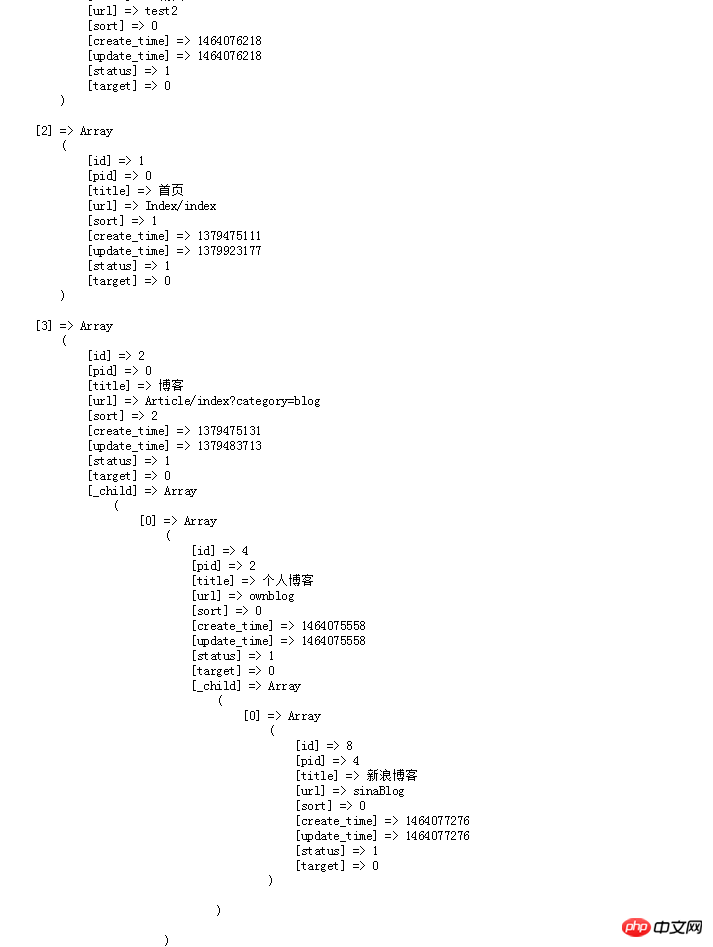
This article mainly introduces the implementation method of PHP Infinitus classification function, and analyzes in detail the specific ideas, implementation code and related precautions for PHP to implement Infinitus classification in the form of examples. Friends in need can refer to it
The example in this article describes the implementation method of PHP Infinitus classification function. Share it with everyone for your reference, the details are as follows:
When developing a program, sometimes we need to obtain all columns (including first-level columns, second-level columns, third-level columns, etc.) and follow the parent-child Relationships form a tree structure. You can use recursion or reference (references in php are similar to pointers in C or C, just another way of saying it).
Realize Infinitus classification through reference
Ideas:
1. That is, all the data to be processed are packaged into subscripted primary key id ( pk) array to facilitate obtaining the corresponding parent column with pid.
2. Loop over the wrapped data, and if it is the root node, add its reference to the tree, otherwise, add its reference to the child element of its parent class. In this way, although only the root node is added to the tree, if each root node has child elements, it contains references to the child elements. Therefore, it can form a tree shape.
The code is as follows
/**
* 把返回的数据集转换成Tree
* @param array $list 要转换的数据集
* @param string $pk 自增字段(栏目id)
* @param string $pid parent标记字段
* @return array
* @author dqs <1696232133@qq.com>
*/
function make_tree($list,$pk='id',$pid='pid',$child='_child',$root=0){
$tree=array();
$packData=array();
foreach ($list as $data) {
$packData[$data[$pk]] = $data;
}
foreach ($packData as $key =>$val){
if($val[$pid]==$root){//代表跟节点
$tree[]=& $packData[$key];
}else{
//找到其父类
$packData[$val[$pid]][$child][]=& $packData[$key];
}
}
return $tree;
}The data structure is as follows:

The execution results are as follows
Array
(
[0] => Array
(
[id] => 6
[pid] => 0
[title] => 测试1
[url] => test1
[sort] => 0
[create_time] => 1464076199
[update_time] => 1464076199
[status] => 1
[target] => 0
)
[1] => Array
(
[id] => 7
[pid] => 0
[title] => 测试2
[url] => test2
[sort] => 0
[create_time] => 1464076218
[update_time] => 1464076218
[status] => 1
[target] => 0
)
[2] => Array
(
[id] => 1
[pid] => 0
[title] => 首页
[url] => Index/index
[sort] => 1
[create_time] => 1379475111
[update_time] => 1379923177
[status] => 1
[target] => 0
)
[3] => Array
(
[id] => 2
[pid] => 0
[title] => 博客
[url] => Article/index?category=blog
[sort] => 2
[create_time] => 1379475131
[update_time] => 1379483713
[status] => 1
[target] => 0
[_child] => Array
(
[0] => Array
(
[id] => 4
[pid] => 2
[title] => 个人博客
[url] => ownblog
[sort] => 0
[create_time] => 1464075558
[update_time] => 1464075558
[status] => 1
[target] => 0
[_child] => Array
(
[0] => Array
(
[id] => 8
[pid] => 4
[title] => 新浪博客
[url] => sinaBlog
[sort] => 0
[create_time] => 1464077276
[update_time] => 1464077276
[status] => 1
[target] => 0
)
)
)
[1] => Array
(
[id] => 5
[pid] => 2
[title] => 他人博客
[url] => otherBlog
[sort] => 0
[create_time] => 1464075582
[update_time] => 1464075582
[status] => 1
[target] => 0
)
)
)
[4] => Array
(
[id] => 3
[pid] => 0
[title] => 官网
[url] => http://www.onethink.cn
[sort] => 3
[create_time] => 1379475154
[update_time] => 1387163458
[status] => 1
[target] => 0
)
)Additional Infinitus classification function in OneThink
/**
* 把返回的数据集转换成Tree
* @param array $list 要转换的数据集
* @param string $pid parent标记字段
* @param string $level level标记字段
* @return array
* @author 麦当苗儿 <zuojiazi@vip.qq.com>
*/
function list_to_tree($list, $pk='id', $pid = 'pid', $child = '_child', $root = 0) {
// 创建Tree
$tree = array();
if(is_array($list)) {
// 创建基于主键的数组引用
$refer = array();
foreach ($list as $key => $data) {
$refer[$data[$pk]] =& $list[$key];
}
foreach ($list as $key => $data) {
// 判断是否存在parent
$parentId = $data[$pid];
if ($root == $parentId) {
$tree[] =& $list[$key];
}else{
if (isset($refer[$parentId])) {
$parent =& $refer[$parentId];
$parent[$child][] =& $list[$key];
}
}
}
}
return $tree;
}Realizing infinite classification through recursion
Ideas:
1. Use loops to obtain all root nodes respectively.
2. When obtaining each node, remove the node from the original data and obtain all its child nodes recursively until the original data is empty.
The code is implemented as follows:
function make_tree1($list,$pk='id',$pid='pid',$child='_child',$root=0){
$tree=array();
foreach($list as $key=> $val){
if($val[$pid]==$root){
//获取当前$pid所有子类
unset($list[$key]);
if(! empty($list)){
$child=make_tree1($list,$pk,$pid,$child,$val[$pk]);
if(!empty($child)){
$val['_child']=$child;
}
}
$tree[]=$val;
}
}
return $tree;
}The screenshot of the effect is as follows:

The above is the entire content of this article, I hope it will be helpful to everyone's study.
Related recommendations:
PHPMethods to dynamically execute code_php tips
PHPProgrammer’s Technical Growth Plan_php Digest
The above is the detailed content of How to implement infinite classification function in PHP. For more information, please follow other related articles on the PHP Chinese website!




